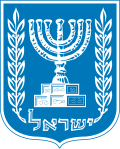| ||||||||||||||
| ||||||||||||||
| ||||||||||||||
| Part of a series on the |
 |
|---|
An election for President of Israel was held in the Knesset on 23 February 1988. [1]
Chaim Herzog stood for re-election as President of Israel as an unopposed candidate.
| ||||||||||||||
| ||||||||||||||
| ||||||||||||||
| Part of a series on the |
 |
|---|
An election for President of Israel was held in the Knesset on 23 February 1988. [1]
Chaim Herzog stood for re-election as President of Israel as an unopposed candidate.
| Candidate | Party | Votes | % | |
|---|---|---|---|---|
| Chaim Herzog | Alignment | 82 | 98.80 | |
| Against | 1 | 1.20 | ||
| Total | 83 | 100.00 | ||
| Valid votes | 83 | 96.51 | ||
| Invalid votes | 1 | 1.16 | ||
| Blank votes | 2 | 2.33 | ||
| Total votes | 86 | 100.00 | ||
| Registered voters/turnout | 120 | 71.67 | ||